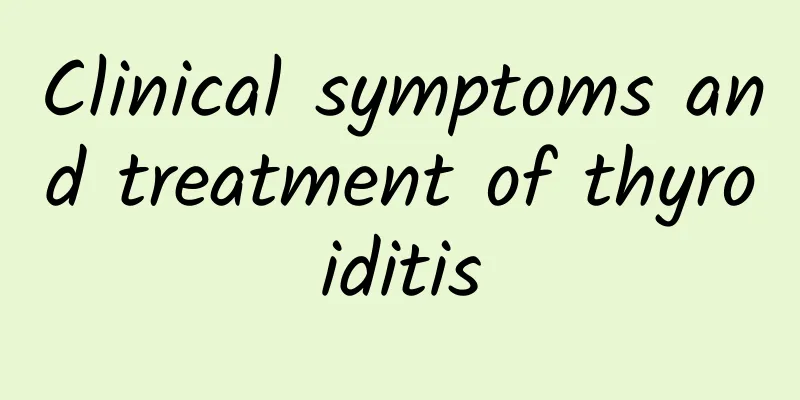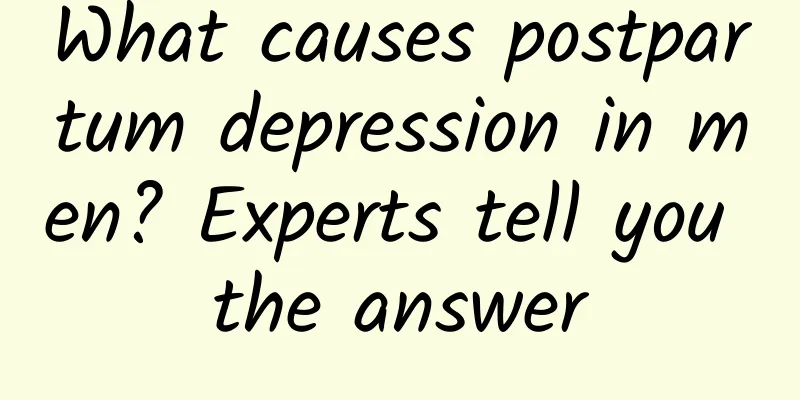Clinical symptoms and treatment of thyroiditis

|
Thyroiditis is a common disease of the thyroid gland. It has various clinical manifestations, including hyperthyroidism or hypothyroidism. Regardless of the type of thyroiditis, it must be actively treated. 1. Clinical symptoms 1. Hashimoto's thyroiditis The disease onset is slow, and the thyroid gland is often enlarged, hard and with clear borders. Some patients may have symptoms of compression. Patients often show symptoms such as fear of cold, edema, fatigue, dry skin, abdominal distension, constipation, and decreased libido. 2. Subacute thyroiditis The typical symptom is severe thyroid pain, which usually starts on one side of the thyroid gland and quickly radiates to other parts of the gland and the base of the ear and jaw. It is often accompanied by general discomfort, fatigue, muscle pain, and fever. 3. Antithyroid The thyroid gland is enlarged to varying degrees and is painless. There is a self-limited period of hyperthyroidism of several weeks, followed by a transient period of hypothyroidism due to depletion of thyroid hormone stores, and finally, usually, restoration of euthyroid function. 4. Acute thyroiditis It is an acute suppurative infection of the thyroid gland. Acute thyroiditis has a rapid onset, with high fever, sweating and general discomfort. Local lumps appear in the thyroid gland, which are very painful, and local skin redness and fever. 2. Treatment Methods 1. Static lymphocytic thyroiditis This is a transient disease that lasts only a few months; the hyperthyroidism phase should be treated conservatively. 2. Subacute thyroiditis For more severe and delayed cases, corticosteroids are recommended, and all symptoms disappear within 24 to 48 hours. When the thyroid gland's radioactive iodine uptake returns to normal, treatment is terminated. 3. Acute thyroiditis Cold compress is suitable for local treatment in the early stage, hot compress is suitable for treatment in the late stage, and antibiotics are given to the whole body. If there is abscess, incision and drainage should be performed early to prevent the abscess from rupturing into the trachea, esophagus, and diaphragm. 4. Hashimoto's thyroiditis Patients with mild thyroid enlargement and no symptoms may not be treated and should be observed during follow-up visits. Patients with obvious thyroid enlargement or hypothyroidism should be given thyroid preparations for treatment, even if only serum TSH is elevated. |
<<: What are the symptoms and causes of vasculogenic headaches?
>>: When is the most accurate time for HIV testing?
Recommend
How to treat allergic urticaria? Experienced and effective remedies for treating urticaria
There are many types of urticaria, and allergic u...
The benefits of cupping for premature ejaculation
Nowadays, men's health problems are increasin...
How does urethral catheterization treat prostate hyperplasia?
When male patients suffer from prostate hyperplas...
What disease is there on the glans penis?
If there are erythema on the male glans, it shoul...
What causes premature ejaculation?
Nowadays, many male friends feel very troubled be...
How to insert a catheter for prostate hyperplasia
Prostatic hyperplasia is a common male prostate d...
What to do if the frenulum itches
The frenulum is a very important part of the male...
Male genital swells and cracks
The male genitals are an important organ for men ...
Can a man have a child after receiving an IV?
The activity and quality of sperm produced in a m...
What medicine should men take for impotence?
Many organs of the human body cannot function nor...
How to remove forehead wrinkles for boys
Many men have forehead wrinkles at an early age d...
How to quickly treat men's kidney deficiency
Whenever we talk about men's health, we will ...
Three temptations can drain a man's body
As material life becomes increasingly abundant, m...
The penis stretcher has grown by 2 cm
Penis stretchers are not common for many people. ...
Why do 35-year-old men have premature ejaculation?
Premature ejaculation affects the married life of...









